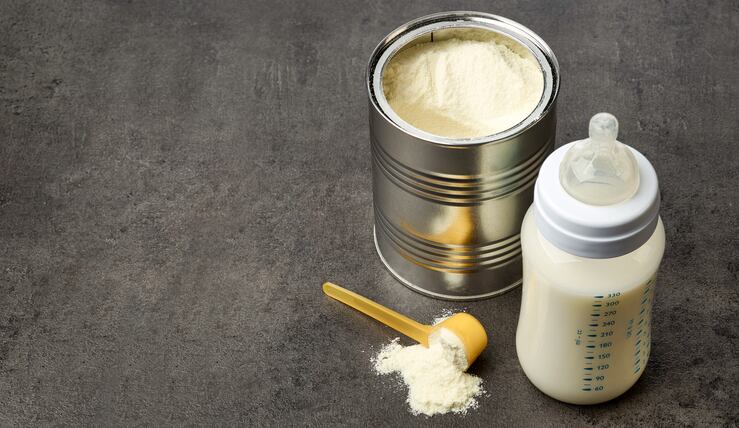The three companies, which are all listed in Hong Kong Exchanges (HKEX), have pointed out the above in their most recent financial reports for the first six months of this year.
Feihe, which is behind the brands Astrobaby, Organic Zhenzhi and Organic Chunrui, said gross profit margin was down from 73.3 per cent to 67.6 per cent mainly due to a decrease in revenue from the classic Astrobaby products.
“The decrease in sales volume of the Group led to an increase in unit fixed cost and also decreased the Group’s gross profit margin,” the firm said.
In the same period last year, Feihe’s group gross profit was up from 70.9 per cent to 73.3 per cent, due to its acquisition of YuanShengTai (YST) Dairy Farm. Hence, YST’s gross profit was also reflected in the group’s gross profit.
Group revenue wise, Feihe’s had dropped 16.2 per cent to RMB$9672.8 million, due to a lower birth rate in Mainland China, while gross profit was down 22.7 per cent to RMB$6,536.6million.
Ausnutria, the owner of infant formula brands Kabrita and Hyproca 1897, said gross profit margin was down three percentage points from 50.1 to 47.1 per cent as of June 30 – showing a declining trajectory as gross profit margin was also down from 52.4 per cent to 50 per cent last year.
As of June 30, the firm’s group revenue dropped 15.1 per cent to RMB$3,630.2 million, partly due to decrease in revenue from its own-branded cow milk powder – which also accounted for about 81.3 per cent of the group’s total revenue.
Biostime’s owner H&H Group, on the other hand, said revenue for its infant formula business in mainland China was down 3.4 per cent to RMB$2,381.4million, though it maintained 5.7 per cent of the overall mainland China infant milk formula market.
Gross profit margin of its baby nutrition care portfolio, which consists of infant formulas and probiotics, have increased from 64.5 per cent to 64.6 per cent, driven by the higher revenue proportion from the high-margin probiotic supplements.
A breakdown shows that the gross profit margin for its infant milk formula was down from 63.4 per cent to 63 per cent.
"Our gross profit margin for our IMF category for the first half this year is 63.0 per cent, which largely remained stable compared to same period last year. This slight decrease was mainly due to rising material costs for the past several months," the firm said in response to queries from NutraIngredients-Asia.
H&H Group believes that rising inflation and supply chain challenges will continue to squeeze its margins in the second half of the year.
“Rising inflation and supply chain challenges will also squeeze margins in the second half of the year.
“However, we will continue to position the business for sustainable growth while combating these margin pressures through product mix optimisation, increasing the price of selected SKUs, as well as with spending efficiency improvements and alternative sourcing,” the firm said.
The challenges
Aside from a lower margin, common challenges in China’s infant formula market include declining birth rates as well as increasing market competition.
In particular, H&H Group said the competition could be intensified by small brands offloading their inventory as they exit the market due to China’s implementation of the new national requirements – aka Guobiao standards – for infant formula products.
“The fast-moving global macroeconomic environment is making conditions even more challenging, with existing supply chain and inflationary pressures.
“In mainland China, the industry environment confronting our BNC business, particularly the IMF segment, is set to become even more demanding as more small brands exit the market and seek to offload their inventory,” the firm said in its financial report.
Citing data from AC Nielsen, Ausnutria said stringent COVID-19 control measures, lower birth rate were reasons for industry-wide sales in mainland China to drop by four per cent.
“Under the influence of the internal and external environment, the infant formula industry is experiencing huge difficulties. Business is returning to its rightful order and nature, representing an opportunity for us who emphasise on long-term development,” Yan said.
He added that the firm would put greater efforts in developing nutritional products and its probiotics businesses.
Super-premium category and NPD
The super-premium infant formula sector has been identified as an area for growth, partly due to increased urbanisation and rising disposable income, according to Feihe.
“Due to increasing urbanisation, rising disposable income and growing health awareness, the demand for high-end infant milk formula products is expected to be the driving force of the overall infant milk formula industry in China,” the firm said.
Citing data from the National Bureau of Statistics, the firm said that China’s per capita annual disposable income in 2021 had reached RMB$35,128, with a CAGR of 8.1 per cent from 2016 to 2021.
The firm believes that such increase would increase the consumption momentum of China’s high-end infant milk formula products.
H&H Group, on the other hand, also entered the stage four formula category in April with its brand Biostime, a move which the brand said would deliver new incremental sales growth opportunities to its overall infant milk formula business.
“This narrowed revenue decline in the IMF category to low single digits with channel inventory levels remaining healthy,” it said.
Ausnutria said that formulas targeting kids three years and above have created another growth potential in the industry.
“As the new generation of parents pay more attention to children’s nutrition and their consumption concepts are gradually upgraded, formulas targeting 3-year-olds or older toddlers has created another growth potential market in the industry,” Yan said.
In March, the firm rode on the opportunity by launching Xiangyang (向阳), a growing-up formula with five nutrients.
It also launched the organic version of its existing infant formula brand Yuebai in view of the market demand for organic goat milk formula, as well as introduced Hyproca 1897 Formula for the Future in April – the first of its human milk oligosaccharides (HMO) formula.
Opportunities in lower-tier cities
Lower-tier cities and rural areas in China were also identified as engines of growth.
Feihe believes that this is because populations in these areas are becoming wealthier and more urbanised, and families in such regions are increasingly able to afford higher-quality infant milk formula product.
“In general, these regions have larger populations and therefore higher potential for consumption growth,” the firm pointed out.
As of June 30, Feihe enjoyed a national distribution network of over 2,000 offline customers – such as retail outlets, maternity stores, supermarkets and hypermarket chains – with more than 100,000 retail points of sale.
Nearly 83 per cent of its total revenue for dairy products were generated from product sales to the offline customers.
Similar, H&H said it would continue to rapidly expand its reach in lower-tier cities through channel expansion strategy.
Inventory management
Inventory management is another issue that is on top of mind for the companies.
H&H said the inventory turnover days for its baby nutrition care products had decreased from 191 days to 175 days in the six months ended 30 June 2021.
It explained that the decrease in inventory turnover days was mainly resulting from the continuous inventory management improvement efforts during the COVID-19 pandemic.
Ausnutria has also been slowing down the delivery of its own-branded cow milk powder to distributors since the end of 2021.
“In light of the unprecedented challenges facing the infant formula industry, the Group has been enforcing more stringent control over the total inventory level of its distribution channel by slowing down the delivery of the own-branded cow milk powder to distributors since the end of 2021,” it said.
Feihe, on the other hand, had further reduced the channel inventory of products such as Astrobaby to maintain product freshness and take tighter control over overall inventory levels in distribution channels.



